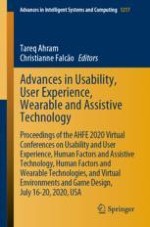2020 | OriginalPaper | Chapter
Technology as a Tool to Improve Student Understanding of Assessment Questions
Authors : Marie A. Lonergan, Lizette De Wet, Andries J. Burger
Published in: Advances in Usability, User Experience, Wearable and Assistive Technology
Publisher: Springer International Publishing
Activate our intelligent search to find suitable subject content or patents.
Select sections of text to find matching patents with Artificial Intelligence. powered by
Select sections of text to find additional relevant content using AI-assisted search. powered by
